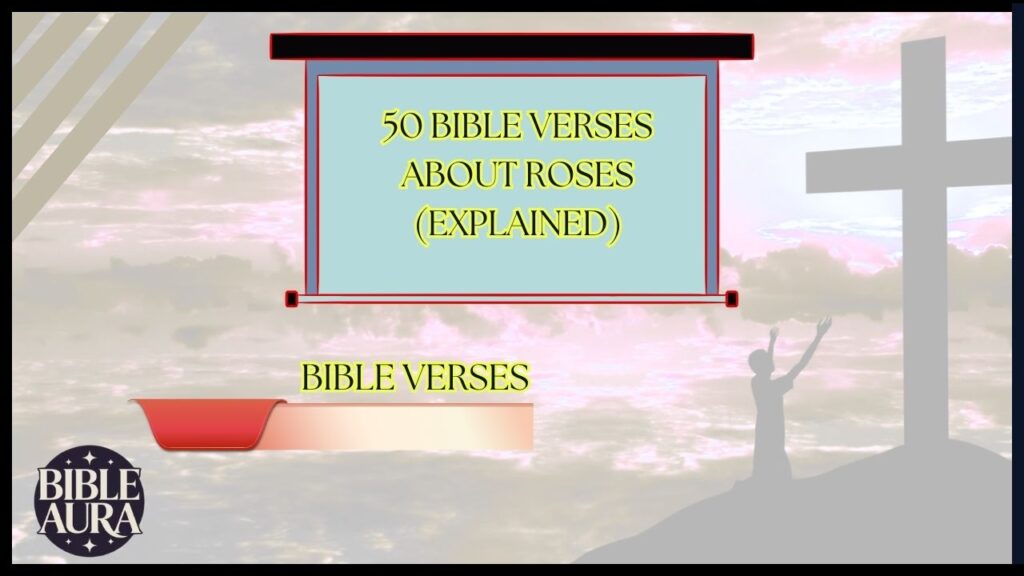Bible Verses About Roses: While roses aren’t frequently mentioned by name in the Bible, they symbolize beauty, love, and God’s creation throughout scripture. The Bible uses floral imagery to convey spiritual truths about life, love, and faith. These passages help us appreciate both natural beauty and deeper spiritual meanings.
Roses have long been associated with God’s love and provision. When we encounter references to flowers, gardens, and natural beauty in scripture, we can draw connections to the rose’s timeless symbolism of love, beauty, and the fleeting nature of life.
Also Read: 41 Important Bible Verses About Letting Go
Roses as Symbols of Beauty and Flourishing
1. Isaiah 35:1-2
“The wilderness and the dry land shall be glad; the desert shall rejoice and blossom like the rose; it shall blossom abundantly and rejoice with joy and singing.”
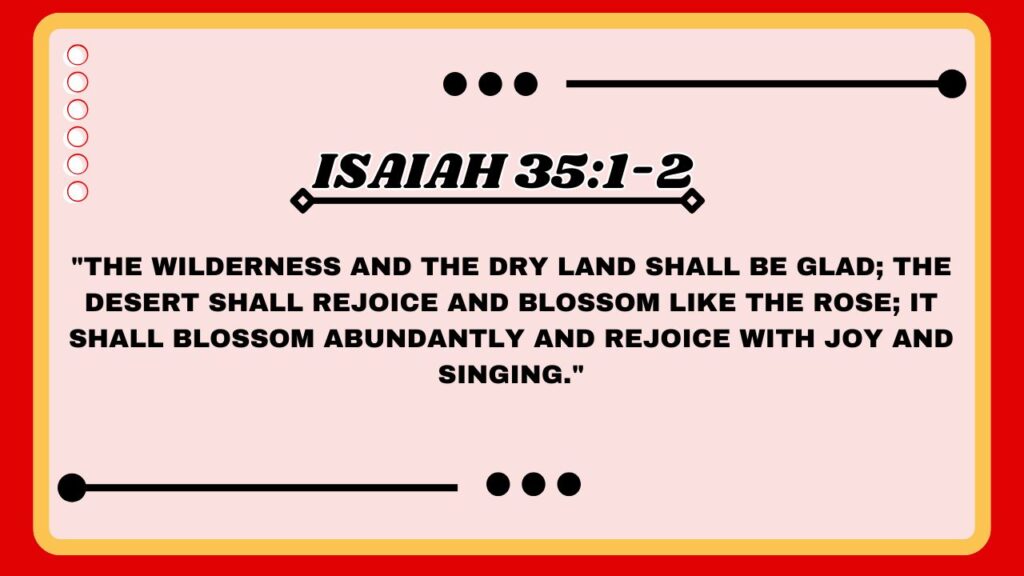
This verse uses the rose as a symbol of transformation and renewal. When God restores His people, even barren places will flourish with beauty. This reminds us that God can bring beauty and restoration to the desolate areas of our lives.
2. Song of Solomon 2:1
“I am a rose of Sharon, a lily of the valleys.”
The beloved in this romantic poetry identifies herself with beautiful flowers. Though scholars debate if this refers to a literal rose, the image conveys exceptional beauty and value. This verse reminds us that we are precious and beautiful in God’s eyes.
3. Hosea 14:5
“I will be like the dew to Israel; he shall blossom like the lily; he shall take root like the trees of Lebanon.”
God promises to refresh His people like morning dew, causing them to flourish like beautiful flowers. Though not specifically mentioning roses, the blossoming imagery reminds us that God’s presence brings growth and beauty to our lives.
4. Ecclesiastes 2:5
“I made myself gardens and parks, and planted in them all kinds of fruit trees.”
Solomon describes creating beautiful gardens that likely contained roses and other ornamental plants. This verse shows how humanity has long valued creating and enjoying beautiful spaces. Creating beauty in our surroundings can be a way to honor God’s creativity.
5. Song of Solomon 2:12
“The flowers appear on the earth, the time of singing has come, and the voice of the turtledove is heard in our land.”
This poetic verse celebrates springtime when flowers (potentially including roses) bloom. It reminds us to appreciate seasonal beauty and God’s faithfulness in natural cycles. We can learn to recognize God’s handiwork in the changing seasons of nature and our lives.
Also Read: 36 Important Bible Verses About Karma
Roses as Metaphors for Life’s Transience and Renewal
6. Isaiah 40:6-8
“All flesh is grass, and all its beauty is like the flower of the field. The grass withers, the flower fades when the breath of the LORD blows on it; surely the people are grass. The grass withers, the flower fades, but the word of our God will stand forever.”
This verse contrasts the temporary nature of earthly beauty with God’s eternal word. Like roses that bloom brilliantly but quickly fade, our physical lives are temporary. This teaches us to value eternal spiritual truths above fleeting worldly beauty.
7. Psalm 103:15-16
“As for man, his days are like grass; he flourishes like a flower of the field; for the wind passes over it, and it is gone, and its place knows it no more.”

Similar to Isaiah’s metaphor, this psalm compares human life to quickly fading flowers. This humbling comparison helps us maintain perspective about our mortality and live with purpose. We should use our brief time on earth wisely.
8. Job 14:2
“He comes out like a flower and withers; he flees like a shadow and continues not.”
Job reflects on the brevity of human life using flower imagery. Though beautiful, flowers (including roses) have a short lifespan, reminding us of life’s fragility. This perspective can inspire gratitude for each day we’re given.
9. 1 Peter 1:24-25
“All flesh is like grass and all its glory like the flower of grass. The grass withers, and the flower falls, but the word of the Lord remains forever.”
Peter quotes Isaiah to emphasize that physical beauty and achievements are temporary while God’s word endures. Like roses that eventually drop their petals, earthly accomplishments fade, but spiritual investments last eternally.
10. James 1:10-11
“The rich will fade away like a flower in the field. For the sun rises with its scorching heat and withers the grass; its flower falls, and its beauty perishes.”
James uses flower imagery to warn against trusting in wealth. Like roses that wilt under harsh sun, wealth and status can disappear quickly. This teaches us to build our security on God rather than material possessions.
Also Read: 39 Important Bible Verses About Long Life
Roses as Reflections of God’s Creation and Provision
11. Matthew 6:28-30
“And why are you anxious about clothing? Consider the lilies of the field, how they grow: they neither toil nor spin, yet I tell you, even Solomon in all his glory was not arrayed like one of these. But if God so clothes the grass of the field, which today is alive and tomorrow is thrown into the oven, will he not much more clothe you, O you of little faith?”
Jesus points to wildflowers as evidence of God’s care for His creation. If God beautifully clothes simple flowers, He will certainly provide for His children. This teaches us to trust God’s provision rather than worry about material needs.
12. Psalm 104:14-15
“You cause the grass to grow for the livestock and plants for man to cultivate, that he may bring forth food from the earth and wine to gladden the heart of man, oil to make his face shine and bread to strengthen man’s heart.”
This psalm celebrates God’s provision through plant life. Though roses aren’t specifically mentioned, they’re part of God’s diverse creation that brings joy to humanity. We can thank God for creating beauty that enriches our lives beyond mere survival.
13. Genesis 1:11-12
“And God said, ‘Let the earth sprout vegetation, plants yielding seed, and fruit trees bearing fruit in which is their seed, each according to its kind, on the earth.’ And it was so. The earth brought forth vegetation, plants yielding seed according to their own kinds, and trees bearing fruit in which is their seed, each according to its kind. And God saw that it was good.”
This creation account includes all flowering plants, which would encompass roses. God intentionally created beauty and declared it “good.” This reminds us that creating and appreciating beauty reflects God’s character.
14. Song of Solomon 4:16
“Awake, O north wind, and come, O south wind! Blow upon my garden, let its spices flow. Let my beloved come to his garden, and eat its choicest fruits.”
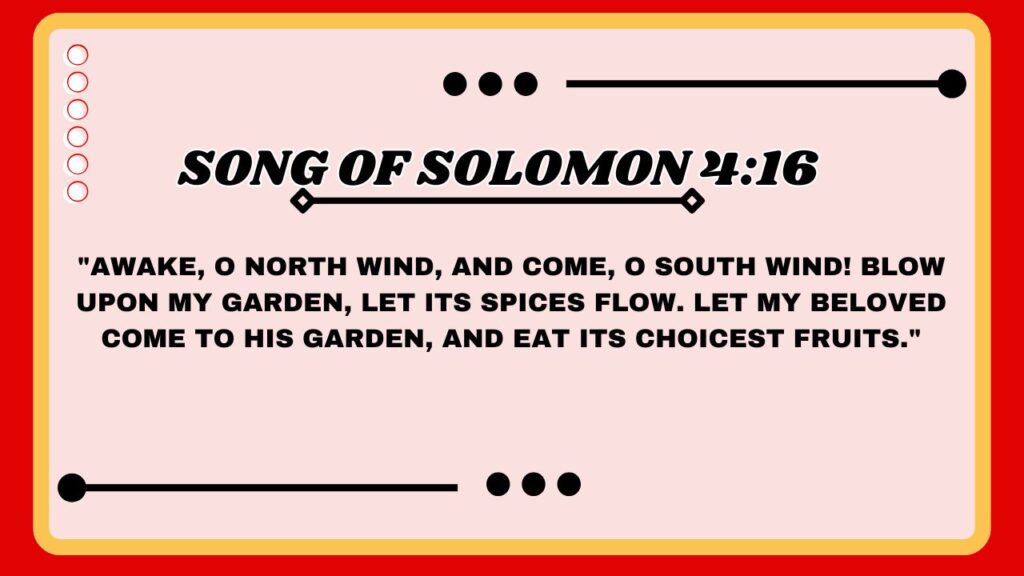
This poetic verse describes a garden filled with aromatic plants, likely including roses. It celebrates the sensory pleasures of God’s creation and the joy of sharing beauty with others. Gardens can be places of connection with God and loved ones.
15. Luke 12:27-28
“Consider the lilies, how they grow: they neither toil nor spin, yet I tell you, even Solomon in all his glory was not arrayed like one of these. But if God so clothes the grass, which is alive in the field today, and tomorrow is thrown into the oven, how much more will he clothe you, O you of little faith!”
Jesus uses flowers to illustrate God’s generous care. Like roses and lilies that display stunning beauty without effort, we receive God’s provision through grace, not works. This teaches us to trust God’s care rather than striving anxiously.
Also Read: 37 Important Bible Verses About Discipline
Roses in Biblical Gardens and Settings
16. Song of Solomon 5:13
“His cheeks are like beds of spices, yielding fragrance. His lips are lilies, dripping liquid myrrh.”
This poetic description uses garden imagery to describe the beloved. Beds of fragrant flowers, possibly including roses, illustrate beauty and desirability. This reminds us that God designed beauty to communicate love and attraction.
17. Song of Solomon 6:2-3
“My beloved has gone down to his garden to the beds of spices, to graze in the gardens and to gather lilies. I am my beloved’s and my beloved is mine; he grazes among the lilies.”
This romantic imagery places the beloved in a garden, gathering flowers and enjoying natural beauty. Gardens were places of intimacy and delight, showcasing God’s creative beauty. Creating beautiful garden spaces can nurture our relationships with others and with God.
18. Genesis 2:8-9
“And the LORD God planted a garden in Eden, in the east, and there he put the man whom he had formed. And out of the ground the LORD God made to spring up every tree that is pleasant to the sight and good for food.”
God’s first act after creating humans was planting a garden with aesthetically pleasing plants. Though roses aren’t specifically mentioned, this shows God values beauty alongside utility. We honor God by appreciating and creating beauty in our environments.
19. Ezekiel 31:8-9
“The cedars in the garden of God could not rival it, nor the fir trees equal its boughs; neither were the plane trees like its branches; no tree in the garden of God was its equal in beauty. I made it beautiful in the mass of its branches, and all the trees of Eden envied it, that were in the garden of God.”
This passage describes magnificent trees in God’s garden. It emphasizes that God values exceptional beauty in His creation. This encourages us to appreciate distinctive beauty in nature and people, including the unique beauty of roses.
20. Jeremiah 31:12
“They shall come and sing aloud on the height of Zion, and they shall be radiant over the goodness of the LORD, over the grain, the wine, and the oil, and over the young of the flock and the herd; their life shall be like a watered garden, and they shall languish no more.”
Jeremiah uses a “watered garden” as a metaphor for abundant life. Well-tended gardens with flourishing flowers like roses represent God’s blessing and provision. This teaches us that God desires to bring refreshment and fruitfulness to our lives.
Also Read: 37 Important Bible Verses About Discipline
Roses as Symbols of Love and Relationship
21. Song of Solomon 7:12-13
“Let us go out early to the vineyards and see whether the vines have budded, whether the grape blossoms have opened and the pomegranates are in bloom. There I will give you my love.”
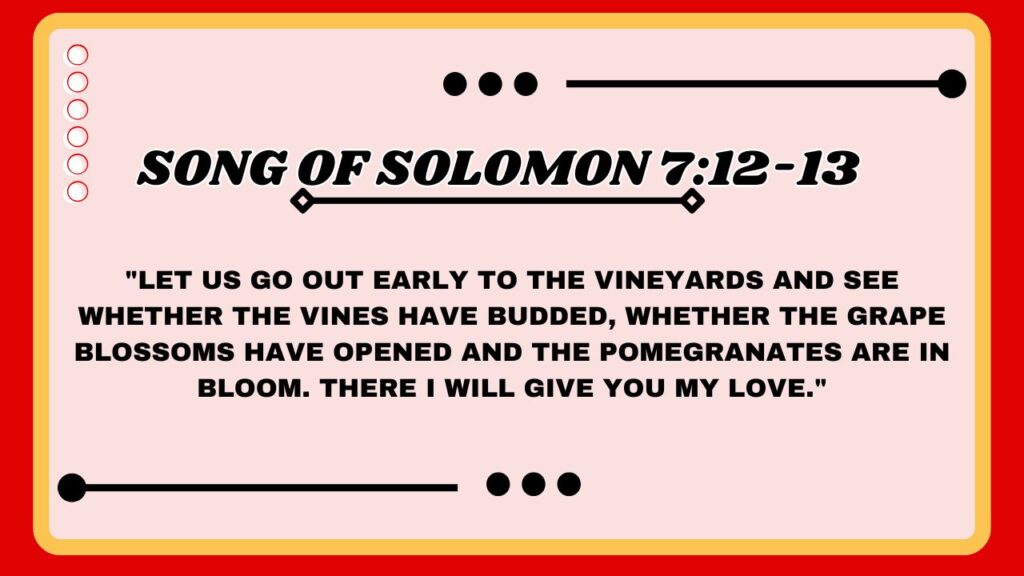
This romantic passage connects blooming plants with expressions of love. Gardens with flowers like roses provide settings for deepening relationships. Nature’s beauty can enhance our expressions of love toward others.
22. Ecclesiastes 3:1-2
“For everything there is a season, and a time for every matter under heaven: a time to be born, and a time to die; a time to plant, and a time to pluck up what is planted.”
This wisdom acknowledges life’s seasons, including planting and harvesting. Roses, with their cycles of dormancy and blooming, illustrate these natural rhythms. Understanding life’s seasons helps us accept both joyful and difficult times.
23. Song of Solomon 4:12-14
“A garden locked is my sister, my bride, a spring locked, a fountain sealed. Your shoots are an orchard of pomegranates with all choicest fruits, henna with nard, nard and saffron, calamus and cinnamon, with all trees of frankincense, myrrh and aloes, with all choice spices.”
This passage compares the beloved to a fragrant garden filled with precious plants. Though roses aren’t explicitly named, the garden imagery conveys treasured beauty and value. This teaches us to see and celebrate the unique value in those we love.
24. Proverbs 31:30-31
“Charm is deceitful, and beauty is vain, but a woman who fears the LORD is to be praised. Give her of the fruit of her hands, and let her works praise her in the gates.”
This wisdom distinguishes between temporary physical beauty and lasting spiritual beauty. Like roses that fade, external beauty is fleeting, while godly character endures. This helps us value internal beauty above superficial appearances.
25. John 15:1-2
“I am the true vine, and my Father is the vinedresser. Every branch in me that does not bear fruit he takes away, and every branch that does bear fruit he prunes, that it may bear more fruit.”
Jesus uses garden imagery to describe spiritual growth. Like roses that need pruning to flourish, our spiritual lives sometimes require painful cutting back to produce greater beauty. This teaches us to accept difficult seasons as opportunities for growth.
Roses in Worship and Spiritual Devotion
26. Psalm 92:12-13
“The righteous flourish like the palm tree and grow like a cedar in Lebanon. They are planted in the house of the LORD; they flourish in the courts of our God.”
This psalm compares the righteous to flourishing plants. Though roses aren’t specified, the imagery of thriving plants in God’s presence applies to all beautiful flora. Regular worship helps us grow spiritually and display God’s beauty.
27. 1 Chronicles 16:29
“Ascribe to the LORD the glory due his name; bring an offering and come before him! Worship the LORD in the splendor of holiness.”
This verse encourages bringing offerings in worship. Throughout history, flowers like roses have been used as worship offerings, symbolizing beauty given back to the Creator. Our finest gifts, including beautiful things, can be offered in worship.
28. Revelation 21:1-4
“Then I saw a new heaven and a new earth, for the first heaven and the first earth had passed away, and the sea was no more. And I saw the holy city, new Jerusalem, coming down out of heaven from God, prepared as a bride adorned for her husband.”
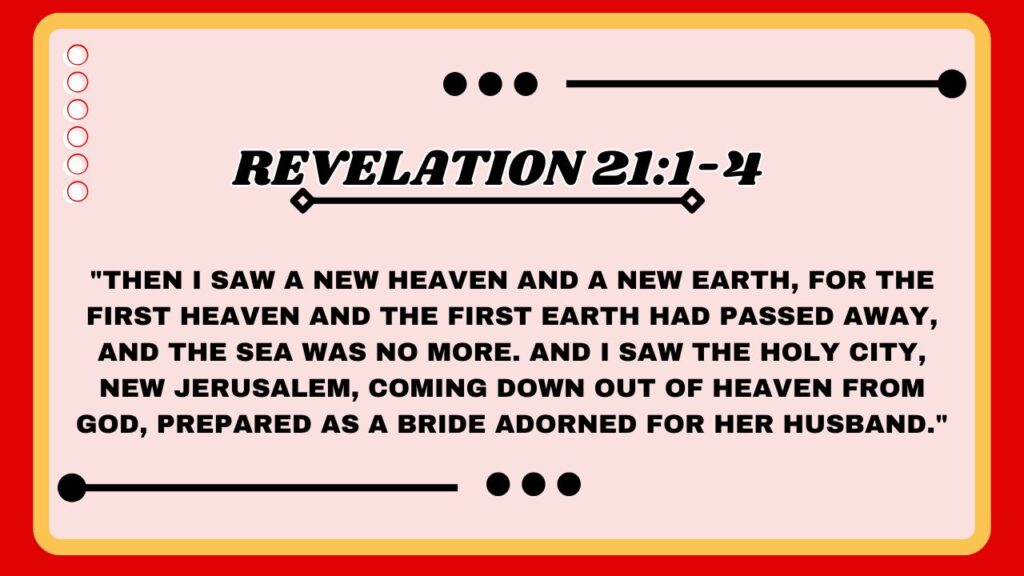
This vision of the new creation uses bridal imagery, which would traditionally involve flowers like roses. The beauty of creation will be perfected in the new heaven and earth. This gives us hope for eternal beauty beyond this world’s imperfections.
29. Song of Solomon 2:3-4
“As an apple tree among the trees of the forest, so is my beloved among the young men. With great delight I sat in his shadow, and his fruit was sweet to my taste. He brought me to the banqueting house, and his banner over me was love.”
This romantic passage describes finding delight in the beloved’s presence. The garden setting creates a backdrop for intimate relationship. This can symbolize how we find joy in God’s presence, surrounded by His beautiful creation.
30. Revelation 22:1-2
“Then the angel showed me the river of the water of life, bright as crystal, flowing from the throne of God and of the Lamb through the middle of the street of the city; also, on either side of the river, the tree of life with its twelve kinds of fruit, yielding its fruit each month. The leaves of the tree were for the healing of the nations.”
This heavenly vision includes abundant plant life surrounding God’s throne. The perfected creation will include the most beautiful aspects of our current world, likely including flowers like roses. This gives us a glimpse of creation’s ultimate restoration.
Also Read: 47 Bible Verses About Being Set Apart (Explained)
Roses as Metaphors for Spiritual Growth
31. Psalm 1:3
“He is like a tree planted by streams of water that yields its fruit in its season, and its leaf does not wither. In all that he does, he prospers.”
This psalm compares the righteous person to a well-watered tree. Like roses that thrive with proper care, spiritual flourishing requires being rooted in God’s word. Regular spiritual nourishment helps us display God’s beauty in our lives.
32. Jeremiah 17:7-8
“Blessed is the man who trusts in the LORD, whose trust is the LORD. He is like a tree planted by water, that sends out its roots by the stream, and does not fear when heat comes, for its leaves remain green, and is not anxious in the year of drought, for it does not cease to bear fruit.”
Jeremiah uses plant imagery to illustrate trust in God. Like roses that develop deep roots to withstand difficult conditions, trusting God helps us remain spiritually vibrant during trials. Building deep spiritual roots prepares us for life’s challenges.
33. Colossians 2:6-7
“Therefore, as you received Christ Jesus the Lord, so walk in him, rooted and built up in him and established in the faith, just as you were taught, abounding in thanksgiving.”
Paul encourages believers to be rooted in Christ. Like roses that draw nourishment through their roots, our spiritual lives thrive when deeply connected to Christ. This teaches us to maintain our connection to Christ as our source of life.
34. Mark 4:8
“And other seeds fell into good soil and produced grain, growing up and increasing and yielding thirtyfold and sixtyfold and a hundredfold.”
In Jesus’ parable, seeds in good soil produce abundant growth. Like roses that flourish in proper conditions, our spiritual lives thrive in the right environment. This encourages us to create conditions conducive to spiritual growth.
35. 2 Peter 3:18
“But grow in the grace and knowledge of our Lord and Savior Jesus Christ. To him be the glory both now and to the day of eternity. Amen.”
Peter exhorts believers to continue growing spiritually. Like roses that develop gradually, spiritual maturity is a process requiring time and nurture. This reminds us that spiritual growth continues throughout our lifetime.
Roses in Biblical Prophecy and Promise
36. Isaiah 55:12-13
“For you shall go out in joy and be led forth in peace; the mountains and the hills before you shall break forth into singing, and all the trees of the field shall clap their hands. Instead of the thorn shall come up the cypress; instead of the brier shall come up the myrtle; and it shall make a name for the LORD, an everlasting sign that shall not be cut off.”

Isaiah describes creation’s joyful response to God’s redemption. Thorny plants (like wild roses) being replaced with beautiful trees represents transformation. God promises to replace life’s painful aspects with beauty and blessing.
37. Hosea 14:6-7
“His shoots shall spread out; his beauty shall be like the olive, and his fragrance like Lebanon. They shall return and dwell beneath my shadow; they shall flourish like the grain; they shall blossom like the vine; their fame shall be like the wine of Lebanon.”
Hosea uses plant imagery to describe Israel’s restoration. Like roses that recover after pruning, God’s people will be restored and flourish again. This offers hope that God can bring renewal after seasons of difficulty.
38. Joel 2:22
“Fear not, you beasts of the field, for the pastures of the wilderness are green; the tree bears its fruit; the fig tree and vine give their full yield.”
Joel prophesies restoration after devastation. The return of plant life, including flowering plants like roses, signals God’s blessing. Environmental flourishing often accompanies spiritual renewal in biblical prophecy.
39. Amos 9:13-14
“‘Behold, the days are coming,’ declares the LORD, ‘when the plowman shall overtake the reaper and the treader of grapes him who sows the seed; the mountains shall drip sweet wine, and all the hills shall flow with it. I will restore the fortunes of my people Israel, and they shall rebuild the ruined cities and inhabit them.'”
Amos prophesies abundant agricultural blessing. Flourishing gardens, potentially including roses, would be part of this promised restoration. God’s redemptive plan includes restoring creation’s beauty and abundance.
40. Micah 4:4
“But they shall sit every man under his vine and under his fig tree, and no one shall make them afraid, for the mouth of the LORD of hosts has spoken.”
Micah envisions peaceful prosperity where people enjoy their gardens without fear. Garden settings with beautiful plants like roses represent shalom God’s comprehensive peace. Creating peaceful garden spaces can remind us of God’s promised future.
Also Read: 39 Bible Verses About Revival
Roses as Reflections of Divine Beauty
41. Psalm 27:4
“One thing have I asked of the LORD, that will I seek after: that I may dwell in the house of the LORD all the days of my life, to gaze upon the beauty of the LORD and to inquire in his temple.”
David desires to behold God’s beauty. Creation’s beauty, including roses, offers glimpses of divine beauty. Appreciating natural beauty can be a spiritual practice that connects us with God.
42. Psalm 19:1
“The heavens declare the glory of God, and the sky above proclaims his handiwork.”
This psalm affirms that creation reveals God’s glory. Roses and other beautiful plants “declare” God’s creativity and attention to detail. We can worship God by noticing and appreciating His handiwork in nature.
43. Romans 1:20
“For his invisible attributes, namely, his eternal power and divine nature, have been clearly perceived, ever since the creation of the world, in the things that have been made. So they are without excuse.”

Paul teaches that creation reveals God’s attributes. The beauty, complexity, and design of roses can point us toward their Creator. Nature’s beauty serves as evidence of God’s existence and character.
44. Psalm 96:11-12
“Let the heavens be glad, and let the earth rejoice; let the sea roar, and all that fills it; let the field exult, and everything in it! Then shall all the trees of the forest sing for joy.”
This psalm portrays creation worshiping God. Flowering plants like roses participate in this cosmic praise through their beauty. Appreciating creation’s beauty can inspire our own worship of the Creator.
45. Ecclesiastes 3:11
“He has made everything beautiful in its time. Also, he has put eternity into man’s heart, yet so that he cannot find out what God has done from the beginning to the end.”
Solomon reflects on God’s perfect timing in creating beauty. Roses, which bloom in their appointed season, illustrate this divine timing. This teaches us patience with God’s timing in our lives and in creation.
Also Read: 36 Important Bible Verses About Casting Out Demons
Roses in Christian Living and Character Development
46. Philippians 4:8
“Finally, brothers, whatever is true, whatever is honorable, whatever is just, whatever is pure, whatever is lovely, whatever is commendable, if there is any excellence, if there is anything worthy of praise, think about these things.”
Paul encourages focusing on lovely things. Roses, as examples of natural beauty, can direct our thoughts toward what is lovely. Filling our minds with beautiful things helps develop godly character.
47. Galatians 5:22-23
“But the fruit of the Spirit is love, joy, peace, patience, kindness, goodness, faithfulness, gentleness, self-control; against such things there is no law.”
Paul lists beautiful spiritual qualities. Like roses that develop gradually but display stunning beauty, spiritual fruit grows through relationship with God. The beauty of godly character develops progressively in our lives.
48. 2 Corinthians 2:15
“For we are the aroma of Christ to God among those who are being saved and among those who are perishing.”
Paul describes believers as Christ’s fragrance. Like roses known for their sweet scent, Christians should be known for the attractive quality of Christ’s character. Our lives should draw others to Christ through spiritual beauty.
49. Matthew 7:16-20
“You will recognize them by their fruits. Are grapes gathered from thornbushes, or figs from thistles? So, every healthy tree bears good fruit, but the diseased tree bears bad fruit.”
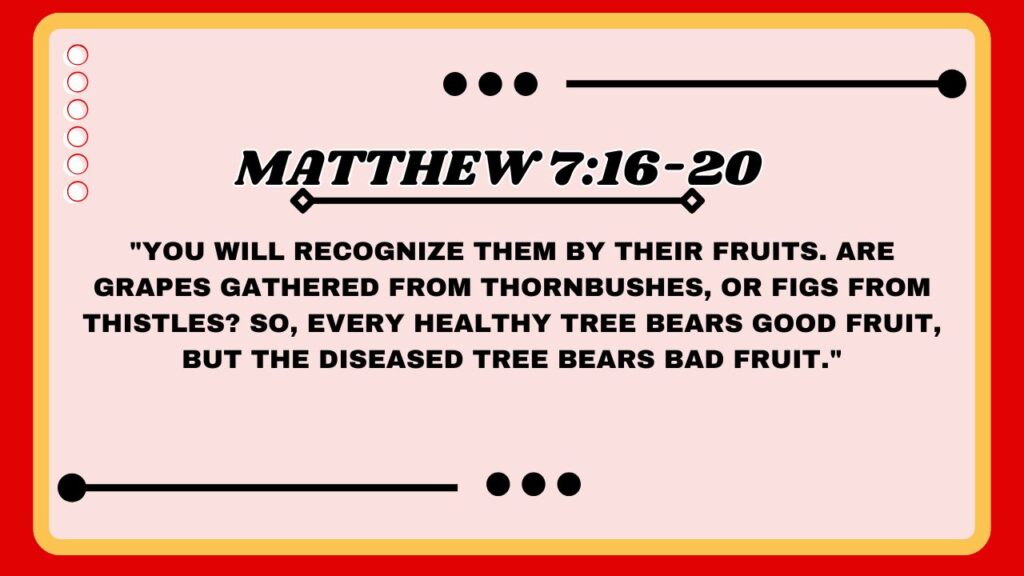
Jesus teaches that character is revealed by its “fruit.” Like roses that reveal their variety through their blooms, our true nature is displayed through our actions. Consistent spiritual beauty comes from genuine inner transformation.
50. Revelation 2:7
“To the one who conquers I will grant to eat of the tree of life, which is in the paradise of God.”
Jesus promises access to paradise for those who overcome. The paradise imagery would include perfect gardens with the most beautiful flowers. This gives hope that creation’s beauty will be perfected in God’s eternal kingdom.
Also Read: 45 Bible Verses About Gossip and Slander (Explained)
Conclusion: Bible Verses About Roses
Though roses are not frequently mentioned by name in the Bible, floral imagery throughout scripture conveys powerful spiritual truths. These verses remind us that beauty is not trivial but reveals God’s character and intentions for creation. Roses and other flowers demonstrate God’s attention to detail, His love of beauty, and His desire to delight His creation.
The temporary nature of roses reminds us of life’s brevity and the importance of focusing on eternal values. Yet their recurring blooms also speak to resurrection and renewal. In scripture, gardens and flowers represent God’s provision, His redemptive work, and His promise of ultimate restoration.
I encourage you to see roses not merely as decorative elements but as reminders of God’s beauty, love, and creative power. Let their fleeting beauty inspire gratitude for the present moment and hope for the eternal beauty that awaits in God’s presence.
Bonus: Practical Ways to Use Rose-Related Bible Verses
- Create a Bible Garden: Plant roses alongside other biblical plants and add small plaques with related verses as a living meditation space.
- Scripture Bouquets: Attach small cards with flower-related verses to rose bouquets when giving them as gifts.
- Prayer Journaling: Press rose petals between journal pages as you reflect on verses about beauty and God’s provision.
- Seasonal Devotions: Study these verses during spring and summer when roses are blooming as seasonal reminders of God’s faithfulness.
- Photography Project: Photograph roses in different stages (bud, bloom, fading) and pair with verses about life’s seasons and God’s constant presence.
- Memory Verse Cards: Create beautiful cards with rose imagery and corresponding verses for memorization.
- Worship Enhancement: Use rose petals or arrangements to create a sensory worship experience focusing on God’s beauty.
FAQ: Bible Verses About Roses
Does the Bible specifically mention roses by name?
The term “rose” appears in a few Bible translations, particularly in Isaiah 35:1 and Song of Solomon 2:1. However, scholars debate whether these translations accurately identify the specific flower we know today as a rose. The Hebrew terms may refer to other flowering plants native to the region.
What spiritual meaning do roses have in Christianity?
Though not explicitly defined in scripture, roses in Christian tradition have come to symbolize God’s love, martyrdom (particularly red roses), and the beauty of creation. They’re often associated with the Virgin Mary in Catholic tradition.
ow can I use these verses for personal devotions?
Consider reading one verse daily during rose blooming season, pairing scripture reading with time in a garden, or creating a study comparing different plant metaphors in the Bible and their spiritual applications.
Are there verses that warn against focusing too much on physical beauty like roses?
Yes, verses like Isaiah 40:6-8, 1 Peter 1:24-25, and Proverbs 31:30 caution against overvaluing temporary physical beauty while neglecting lasting spiritual values.
How can these verses comfort someone who is grieving?
Verses about renewal, God’s beauty, and the temporary nature of earthly existence can provide perspective and hope. The cycle of roses dormancy, blooming, fading, and returning can illustrate the Christian hope of resurrection.
Read more knowledgeable blogs on Bible Aura

Piper McMillan is a passionate writer and educator dedicated to sharing the beauty and depth of the Bible. As the author behind the Piper McMillan website, she explores Bible verses, unlocks biblical narratives, and provides insights for living a Christ-centered life. Through warm, approachable, and inspiring articles, Piper guides readers to deepen their understanding of Scripture and apply its timeless wisdom to daily living. Her mission is to uplift, educate, and help others walk faithfully with God, rooted in His word.

